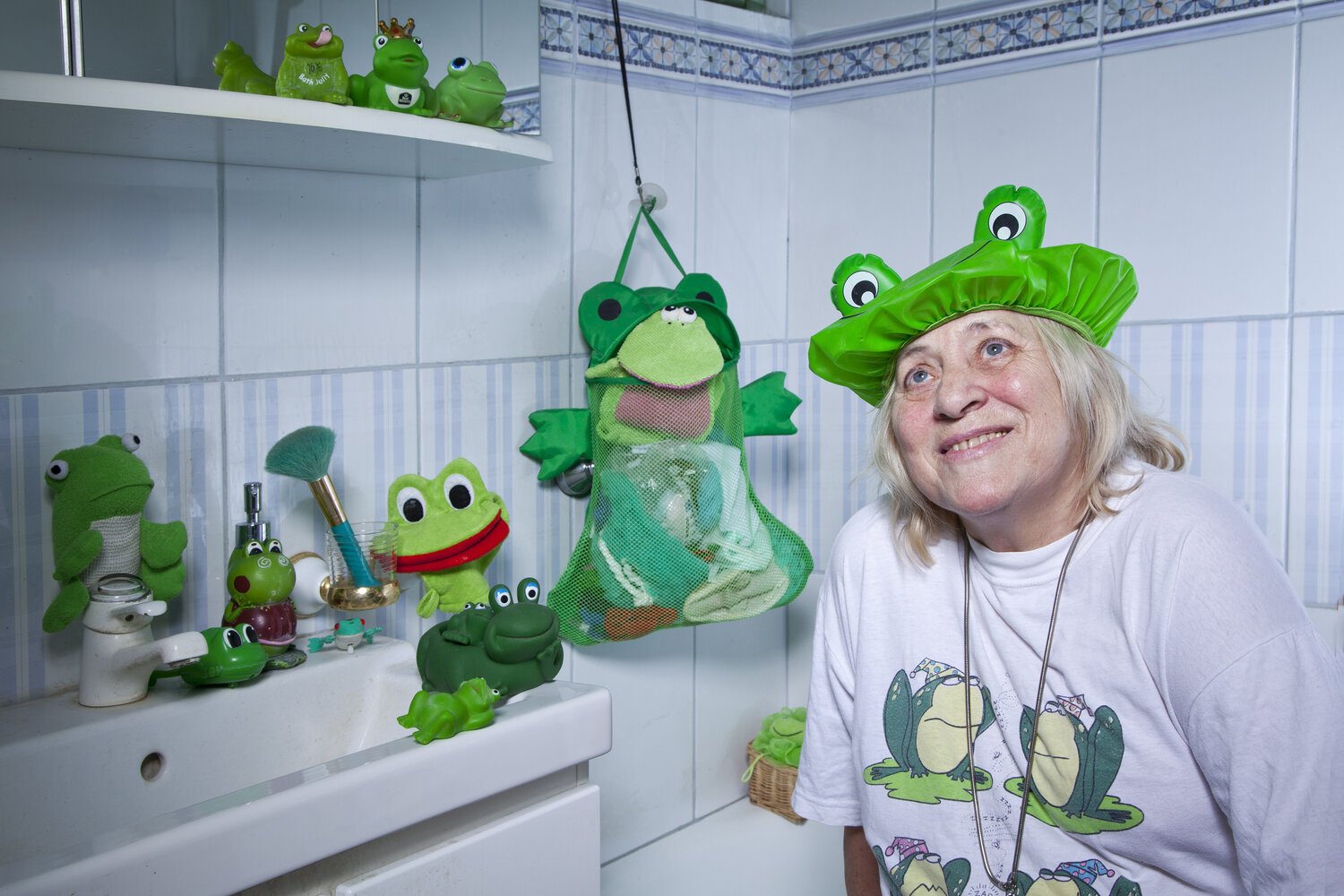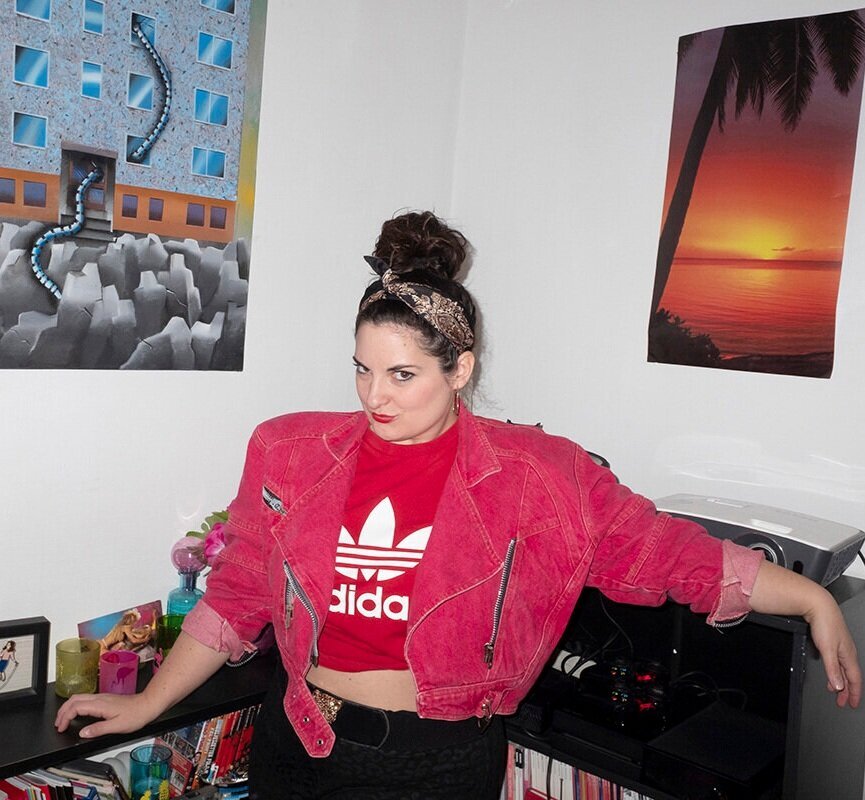Éva Szombat: Not Roses
January 11th, 2021
Imbued with a passionate femininity and political strength, the works of Hungarian photographer Éva Szombat look deep into the worlds of their subjects. Focused on happiness and desire, Éva’s pieces explore contemporary identity as the boldest of statements. Whether it is a collector obsessed with images of frogs, or women taking their own pleasure into their own hands, her connection and frankness with her sitters bring the viewer deep into the hidden parts of modern selfhood. With a distinctive documentary style, Éva uses colour and a softness of focus to create an almost dreamlike state in the viewer - seeing the unseen, sharing in the intimate magic of another’s state of being.
At a difficult time in European politics, we caught up with Éva to talk inspiration, sincerity and the need for sex education to create a happier and healthier population.
POL: First up, can you introduce our readers to yourself and how you would define your work?
ÉS: My name is Éva Szombat, I’m a photographer living and working in Budapest. I’m not very good at introducing myself, so I’d like to just quote my Instagram account: I have a big booty and I listen to The Cure when I’m sad.
POL: You’re perhaps best known for your photographic series and book on happiness, in which you photographed people doing the things they love. Could you say that perhaps your photography is a form of sociological examination? Would you define your work as documentary, even though the images themselves are often constructed/curated?
ÉS: I started taking photos when I was a teenager, this became my primary mode of communication. We were given several tasks at the university that were meant to reflect on society, and photography was perfect for that. It is just a perfect medium to voice your opinion without words; or to ask questions or turn the spotlight on something. I’m trying to do all this in an understandable way, and I’m trying to make it not boring, so I’m not just entertaining myself.
My work on happiness, Practitioners, was definitely a documentary. It was based on reality, even if some of the photos were somewhat staged, I used the objects present in the space. I might have moved some things around, but only to give an essential image of the people I was photographing. I am looking for interesting people, situations, and do my best to show them in an exciting light.
POL: You went from documenting happiness, to taking it to another level in I Want Orgasms, Not Roses [working title] photographing women and their sex toys. It can be regarded as a Feminist act to showcase female desire, do you want your work to be seen as political statement?
ÉS: As I start to see the limits of our world even more, feminism is starting to have a more significant role in my life. The state of womanhood and women’s bodies is becoming a more and more pressing issue. You don’t have to go far away lands to see that. Poland has just outlawed abortion. Hungary is using laws to define what family is so adoption is being restricted for queer people, people whose lives are being made more and more miserable. Our politicians implicitly tell women that earning less than men is perfectly acceptable. So I guess talking about female sexuality can be considered a political statement in this sense. Because we, as women, are strong and our strength to carry is our biggest virtue.
POL: In many ways feminine sexuality is seen as something which is still controversial to explore openly, what drew you to foreground this still quite taboo subject?
ÉS: I want these things to not be taboos anymore, I want to have conversations out in the open, without any shame. I am always conducting interviews with the subjects, and already several traumas have come to light. One of the subjects told me that all the sex she had could have been better if she would’ve opened her mouth. Education is very important at an early age, and sexuality must be taught not just biologically, but mentally as well. Children have to be educated about abuse, about what constitutes abuse, and maybe if they are aware, they will avoid it or recognise it if it happens to them. Many of my subjects have told me that they haven’t received enough sexual education when they were young, and some told me that only through therapy did they realise how much abuse they have suffered.
POL: How do you find the people you photograph?
ÉS: Mainly through friends or acquaintances, but I’ve met a stranded merman on the street, or I’ve put up an ad looking for people willing to show me their sex toys or religions objects.
POL: Looking at your project Beyond the Curve, you turned the camera inwards to document yourself and major events in your life. What drew you to self portraiture in this way? How does creating and sharing a shoot differ when you’re photographing yourself rather than others?
ÉS: Technically it is definitely more difficult to shoot, and I especially have problems with the focus when I’m shooting on film. But I treat myself like I would treat a subject: with respect, patience, and a little humour.
“I’ve met a stranded merman on the street, or I’ve put up an ad looking for people willing to show me their sex toys or religions objects.”
POL: It’s really interesting in your work to see the line between sincerity and humour, in a project like If Even Jesus Smiles on the Cross, for example, whilst the images can feel quite light and the juxtapositions within them almost humorous, you are never making fun of your subjects. Was this a purposeful decision to lean into earnestness over irony?
ÉS: Irony can be entertaining, but you have to be careful with it. When I’m shooting people, they let me into their intimate space, telling me all these intimate things, opening up. I am extremely grateful on these occasions, and I would never consider shooting with irony. But in general, it’s better if you don’t take life seriously, it’s too short to be rigid.
POL: How would you describe your relationship with the word “Kitsch”? It is used a lot to describe your work but at the same time you don’t seem entirely comfortable with that label.
ÉS: My work has been described as kitschy from the beginning, but I’m starting to reject that description. Kitsch implies something negative, something that’s of lesser quality or worth, and I don’t see my work as that. I use the aesthetics of kitsch, but my works are anything but.
POL: You grew up at a strange time in European history, in Hungary as it emerged from behind the Iron Curtain. Would you say this has had an impact on your aesthetic style? Would you say there is something specific in your work which reflects your country and it’s history?
ÉS: Growing up the 90s was very liberating, we seemed to have all these opportunities ahead of us, we had Western TV channels, everything was colourful and brash. My visual style was definitely influenced by my surroundings.
On the other hand, I think this country was never able to be content with something, and we are filled with melancholy, anxiety, and frustration. We love to complain, and most people find it easier to hate something unusual than accept and like it. My work definitely has all those layers.
“I think this country was never able to be content with something, and we are filled with melancholy, anxiety, and frustration. We love to complain, and most people find it easier to hate something unusual than accept and like it. My work definitely has all those layers.”
POL: Through use of colour and soft focus there is something quite surreally cinematic about your photography, would you say classic cinema has inspired your photography? Do you have any influences or references which you return to time and time again?
ÉS: Absolutely, I love older films and I can be astonished by how they created effects before the CGI-era. My husband is a film journalist, and we watch a lot of them, and he sometimes selects them according to their visuality, their colour scheme, or the use of different filters, or how groundbreaking their visual style was in their era. But most of my favourites are from my childhood: Labyrinth or Priscilla Queen Of The Desert and Cry Baby.
POL: We’d like to talk a little bit about how you’ve displayed your work in the past, your images aren’t just shown in white walled galleries, rather you have created immersive spaces and display your work in non-traditional ways. What drew you to show your work in this way? How do you want people to feel when interacting with your images?
ÉS: I feel that photos do not end at the moment when they leave the camera, their frame and surroundings are just as important. Nowadays we look at images on our computer screen, but when it enters our physical space, we have to give it a proper presentation. For me, the presentation of an image is a very important part of its aesthetic and its meaning.
POL: If time and money were no object, what would your dream project be?
ÉS: I’d like to make a erotic shoot of my husband on a yacht wearing a bathrobe and dressed and styled as a millionaire. We have everything at hand, except a yacht.
POL: What are you working on now? What’s next?
ÉS: I’m still working on my series with women and their sex toys, there are still a lot of women in a lot of different communities in Hungary who I’d like to meet and shoot and interview. I have just received a fellowship from Budapest’s Capa Center for continuing my work on this series. I am also presenting another series of mine soon, called Tutti Frutti, which is about the return of the style and iconography of my childhood, and the relationship young people have with the visual world of what I grew up with.
“As I start to see the limits of our world even more, feminism is starting to have a more significant role in my life. The state of womanhood and women’s bodies is becoming a more and more pressing issue. You don’t have to go far away lands to see that. Poland has just outlawed abortion. Hungary is using laws to define what family is so adoption is being restricted for queer people, people whose lives are being made more and more miserable. Our politicians implicitly tell women that earning less than men is perfectly acceptable. So I guess talking about female sexuality can be considered a political statement in this sense.”
About Éva Szombat
Éva Szombat is a photographer working and living in Budapest. Her unique blend of glamour and sociological examination has appeared in local and international magazines, and websites including, but not limited to, Vice, Huffington Post, Ignant, Neon, Blink magazine, GUP Magazine, Vogue Spain and Feature Shoot.
She got her masters' degree in Photography from MOME (2012), and she received the Pécsi József Scholarship between 2013 and 2016, when she examined the phenomenon of happiness and its effect on people. She released two books on the subject, the limited edition Happiness, and Practitioners. She won artistic scholarships in Paris and New York. Her works were displayed in New York, Jerusalem, Milan, Vienna, Berlin, Bogota among other places.
She is currently working on several new series, teaching photography at MOME, and she is very happy herself.
























